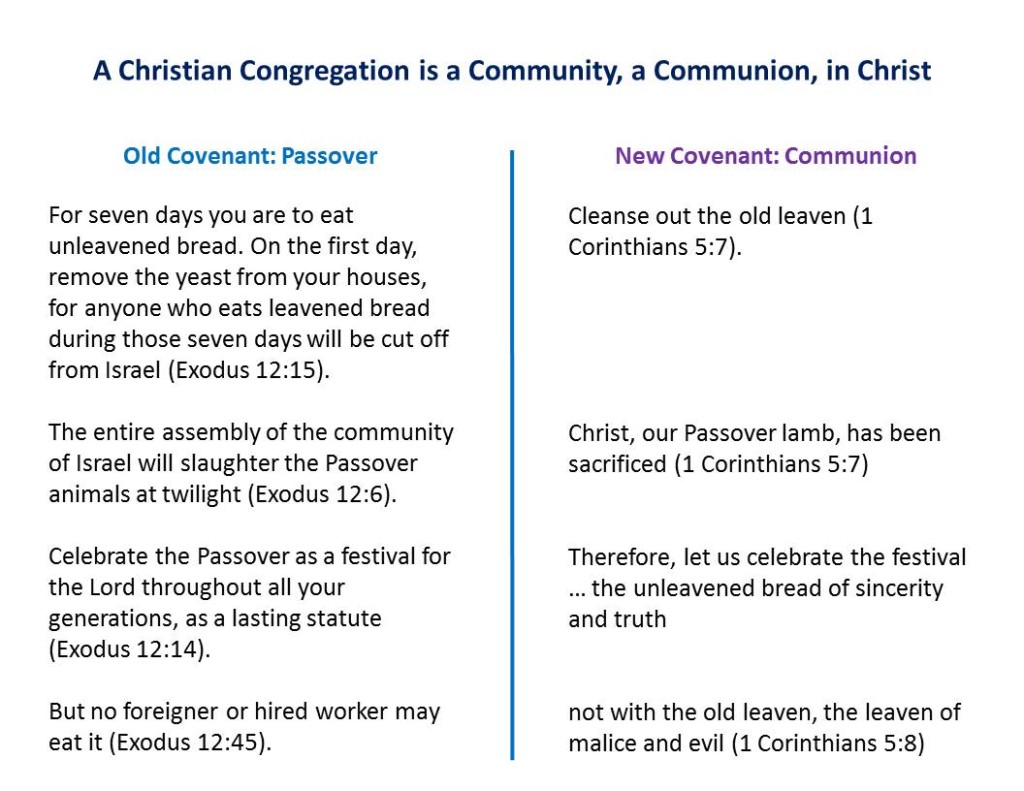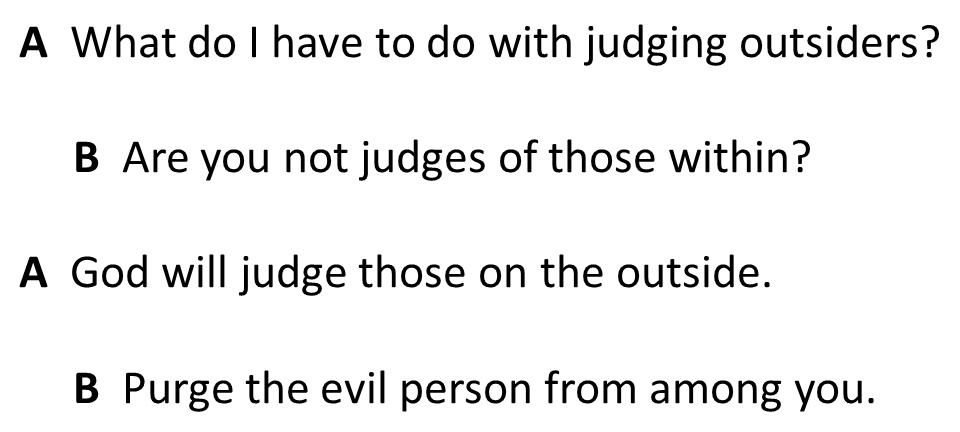![THE GRADUATE [US 1967]DUSTIN HOFFMAN, ANNE BANCROFT](https://kimberlinglutheran.com/wp-content/uploads/2015/02/The-Graduate-610x351-300x173.jpg) In the first four chapters, when dealing with sin, Paul dealt with division in the Corinthian congregation expressed by favoring one pastor over another. In chapter 5, Paul switches subjects: he is still dealing with sin but the sin is related to the gift of sexuality. How are Christians living in Christ to live out the faith when it comes to sexual relations?
In the first four chapters, when dealing with sin, Paul dealt with division in the Corinthian congregation expressed by favoring one pastor over another. In chapter 5, Paul switches subjects: he is still dealing with sin but the sin is related to the gift of sexuality. How are Christians living in Christ to live out the faith when it comes to sexual relations?
In the process of tackling that topic, we find that Paul reveals a worldview that incorporates God’s teachings in the Old Covenant, but understood and applied within the context of the New Covenant. Thus, Paul shows us that we don’t excise the Old Testament from our understanding of the faith, but neither do we understand the Old Testament in an Old-Covenant way. To do either, is to fail in faithfully understanding who we are as His people.
The Sin
Read 1 Corinthians 5:1
Read Leviticus 18:1-8 for an Old-Testament backdrop.
Leviticus 20:11: If a man has sexual relations with his father’s wife, he has uncovered his father’s nakedness.
- What was the sin of the man mentioned in this verse?
- What is meant by “father’s wife”?
- How did the sexually permissive culture of Paul’s day view what the man was doing?
A Congregation is a Community in Christ
Read 1 Corinthians 5:2
Note that Paul addresses the Corinthian congregation using the plural “you.”
- When Paul says the Corinthian congregation was “arrogant,” what clues can we see in the text that lets us know how their arrogance displayed itself?
- What two acts did Paul expect the congregation to be doing instead of being “arrogant”?
- How do we know that this is not just the sin of an individual, but also the sin of the congregation?
- What then did the Corinthian congregation fail to see itself as?
A Congregation is Holy
Read 1 Corinthians 5:3-4
Paul now goes on to show that not only is a congregation to see itself as a community united in and by Christ, but such unity extends ever further.
- Although Paul is not present in Corinth physically, how is he there? (vs. 3)
- Specifically, when is Paul present with them? (vs. 4)
- If a congregation is united to all other Christians through Christ, what then are the implications of what a congregation does during worship?
Read 1 Corinthians 5:5
Read Leviticus 10:1-5 for an Old-Testament backdrop.
- What does Paul tell the congregation to do?
- How does this act show that a congregation is to be holy?
Discuss: If we are all tainted with sin and commit sin, then why are we all not excommunicated? What is different about the man who was sleeping with his “father’s wife”?
- What is the ultimate purpose for such exclusion?
Excursus: Erring in the Knowledge of God
When someone misunderstands who God is, that then cascades info further error in how someone lives out the faith.
- If one sees God as a stern judge whose favor we gain by what we do, instead of because of Christ, then we do our best to do what is right to earn God’s favor. Such a worldview was common among the Jews of Jesus’ day.
- If someone misunderstands that the love of God in Christ means that all sins are forgiven (true), but then makes conclusions from that truth based on his sinful nature, he then sees no reason to live the holy life that God has called him to live. That was the situation of the man who had sex with his “father’s wife.” He lived in a state of willful unrepentance.
The Old Testament Apocrypha book of Wisdom, part of the Greek-Language Old Testament (Septuagint), shows how misunderstanding who God is can lead to further sinning:
It was not enough for them to err in their knowledge of God, but they live in a great conflict of ignorance, and they call such evils peace. For whether they sacrifice children in initiation rituals, or celebrate secret religious ceremonies, or engage in frenzied revelry with strange customs, they no longer keep their lives or their marriages pure. Instead, one person plots to kill another by an act of treachery; another causes grief by committing adultery. All is confusion: blood and murder, theft and deceit, depravity, faithlessness, turmoil, lies, confusion over what is good, ingratitude, pollution of souls, sexual perversion, disorder in marriage, adultery, and shamelessness. [Wisdom 14:22-26]
The proper understanding of God and, thus, the faith one has is one of identity, which Paul goes into next. In Christ, we are holy. Therefore, being in Him, we live out that life of holiness.
But properly understanding God also includes that He is not a God of solitude. Although one, He consists of three persons: Father, Son, and Holy Spirit (Genesis 1:26, Isaiah 6:1, Matthew 28:19). The “community” of who God is brings us also to see that they are not lone individuals with an individualistic faith. Instead, we are part of a community, especially when we gather for worship (1 Corinthians 5:2, 4, 6-7); we are holy (1 Corinthians 5:5, 7); and we are in a covenant with God (1 Corinthians 5:11, 13).
————
Celebrating the Lord’s Supper as the Unleavened Bread They Are
Paul continues using the plural “you.” He also brings in Old-Covenant Passover imagery and ties that into a proper understanding of what it means to be a Christian community, most clearly realized in communion, the Lord’s Supper.
Read 1 Corinthians 5:6-8
- Who was the “old leaven” in the Corinthian congregation?
- What should have be done with him when it came to “celebrate the festival” of the Lord’s Supper?
- When Paul wrote, “Let us therefore celebrate the festival,” who is included in the “us”?
- What are the implications of this in a congregation’s practice of whom they admit to communion?
Read 1 Corinthians 5:9-10
- If one misunderstands what it means to be a holy people, what would that mean about being able to this live in this world?
Being a holy people doesn’t mean separating from the world (such as some Christians have tried to in one way or the other: the Amish, Mennonites, monasteries, etc.). To remove yourself from what is unholy in the world would involve removing yourself, for who is untainted with sin? Paul then segues in what it means to be in a covenant with God and how that is communally lived out.
A Congregation is in a Covenant with God
Read 1 Corinthians 5:11
- If all of us are guilty of the sins that Paul mentioned, in one way or another, why is anyone still in the Church of Christ?
- What then does being “guilty” of those sins involve (or when are Christians pronounced guilty of a sin)?
- In the context of this chapter, what does “not even eating with such a one” involve?
Read 1 Corinthians 5:12-13
Paul quotes Deuteronomy 17:7 and 19:19 from the Septuagint: “Purge the evil person from among you.”
In these two verses, Paul used antithetical parallelism, where the second line says the opposite of the first. By building his argument from the Old Covenant, Paul used the relationship between Israel and the Gentiles to show the distinction between the Church and the world.
Excursus: Excommunication from the Congregation/Church
The Church is not to pronounce judgment on the world, but leave that up to God.
However, the Church is to remove those who are willfully unrepentant in their sin because they have already left the Church! Such removal is from love to win him back (See Matthew 18:15-20), which includes not communing him at the Lord’s Table to his judgment (1 Corinthians 11:29). For if he has, through deliberate sinning and unrepentance, moved himself outside the flock of the Church, he has already lost his salvation. The congregation and pastor are to make that point known to him.
The congregation is to do this as a whole (the plural “you” that Paul uses in 1 Corinthians 5 and Matthew 18:15-20); and yet, the pastor is involved. How can he not be? He’s the shepherd, the pastor, of the flock. He gets involved by the “retaining” of that person’s sins, which is a responsibility that Jesus has only given to pastors (John 20:23).
The congregation does not unilaterally exclude such a person from the congregation; neither does the pastor! In such a case, both the pastor and the congregation, the shepherd and flock, act with one voice, delivering a solid, unanimous Word of God to that the fallen brother as a call for him to repent.





